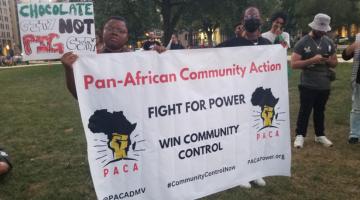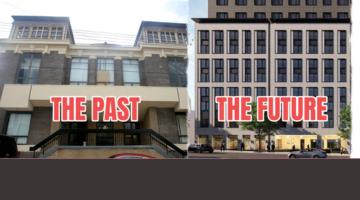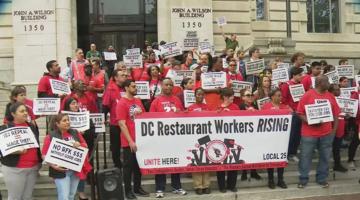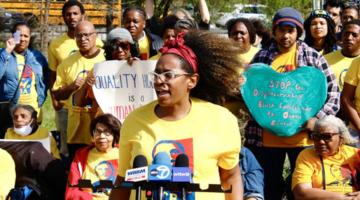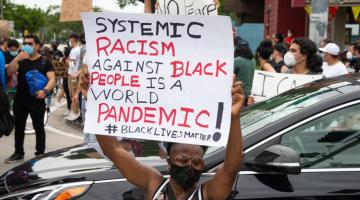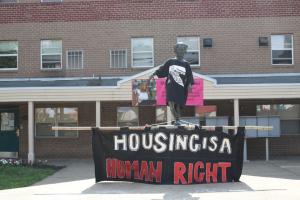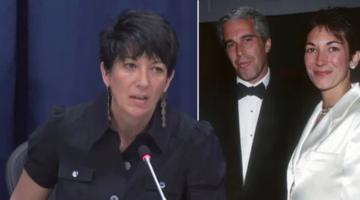Washington DC was once known as Chocolate City. After years of gentrification Black residents are now a minority of the population.
This article was originally published on the author's Patreon.
As I recall it 21 years later, we were seven expats, all from the U.S., assembled at a suburban Johannesburg restaurant named the Singing Fig to fete the celebrated South African photographer, Greg Marinovich, who had recently eloped. His bride, a brunette, Afrikaans woman of maybe 30, sat quietly as the rest of us discussed a recent story in the news – for the life of me I cannot remember what – about post-apartheid South Africa’s racial divisions.
Suddenly, Greg’s newlywed wife exploded. Later everyone would remember that she directed her reproach toward me, the only black customer in the upscale restaurant.
“Why is everything about race with you guys?” she demanded to know. This is 2001; apartheid is over and we’ve moved on!”
I was torn: reflexively, I wanted to call her everything but a child of God, a knuckle-dragging, mouth-breathing Boer whore whose parentage included at least one barnyard animal and possibly two. But I also wanted to take the high road out of respect for Greg, who I considered a friend at the time. So I tried to split the difference.
“I’m not sure exactly how much you’ve moved on from apartheid seeing that here we sit smack dab in the middle of Africa and the only black person sitting down is me,” I said, pausing for dramatic effect to surveil the swarthy servant hordes whizzing by our table.” Everybody else is waiting on white folks hand and foot, but please, we don’t want to monopolize the conversation. What would you like to talk about?”
That seemed to dissipate the tension and we settled in for a pleasant evening but I have thought of that surreal exchange several times in recent days since returning to Washington D.C. for the first time in five years and nearly 30 years after I moved here from Detroit in December of 1992. What was then the majority-black metropolis known proudly as Chocolate City is gone and in its place has risen – like the giant white phallic symbol that is the Washington Monument – the centerpiece of the European settler’s national reclamation project.
Similar to South African apartheid, white people today own practically every inch of the national capital, save for the historically black southeast quadrant which provides the settler economy with a steady supply of barhops, baristas and borrowers who can be overcharged on their auto and student loans just as the all-black South West township, or Soweto, has traditionally served as an extraction zone for South Africa’s white minority.
Evidence of American apartheid abounds: six bone-tired looking black women working furiously behind the downtown Starbucks counter to serve caramel macchiatos and half-caf cappuccinos to stiletto-ed white women with Fendi bags and french poodles; the darkened strip where African American sex workers plied their trade for a dime bag of crack is today aglow with showroom lights from Gucci, Chanel and other high-end boutique stores; the dreadlocked young hotel worker who responded drily to his white boss’s reprimand: “Man, do you know how many jobs I work?”
And at the Subway, a pencil-thin blonde peppered the Salvadoran women fixing her sandwich with a barrage of harassing questions: “Can you not hear me? Do you speak English? Where are you from?”
As the blonde gathered her change, I must’ve had a flashback to the opportunity I squandered in confronting Marinovich’s wife two decades ago. The word “Puta!” entered my head and before I could bar the door, it slipped past my censors and filled the air, loud enough for everyone to hear. The two Latinas snickered as their tormentor slinked off in shame.
More breathtaking than the District’s recolonization, however, is that much like Marinovich’s wife, the white tribes of Washington D.C. seem not to have noticed this stark metamorphosis, nor do any of the settlers seem the least bit bothered by their resemblance to the French in Algeria, the British in Rhodesia, the Belgians in Congo, the Spanish in Cuba or the Afrikaners in South Africa.
In fact, I get the sense that many of the whites in the erstwhile Chocolate City are comforted by the restoration of the full rights and privileges afforded them by the unchallenged settler state, and relish in their power over the darker-skinned. And much like the bullying blonde in Subway, or slaveowners who have put down a revolution, they find it reassuring to once again be in the catbird’s seat in runaway Republics like D.C., Detroit, and Oakland.
Astrophysicists say that some solar systems are so distant that no telescope can detect their presence, but the movement of other celestial bodies clearly indicates the presence of a sun. Similarly, the erasure of black men in suits and ties from Washington D.C.’s central business district makes clear that the target of whites’ resettlement campaign was the African American political class that mushroomed under Marion Barry’s leadership.
He may have been a cad, but Barry did more to extend opportunities to African Americans than any big-city mayor in U.S. history, increasing the number of minority federal contractors in the city from three to 40 percent in his first three terms in office and imbuing his black constituents with so much buying power that they moved across the city’s border and into neighboring Prince George’s County, converting the sleepy backwater into the wealthiest majority-black enclave in the world until only recently.
When I moved to Washington D.C. nearly 30 years ago, blacks accounted for nearly two of every three residents in the city; today the figure is less than half. But it’s not just the loss of population, it’s the loss of power. When the city’s real estate interests managed to install their black mascot, Anthony Williams, in the mayor’s office, he pledged to increase the city’s population by appealing to childless couples. That was, of course, an invitation to white, and gay couples to gentrify Chocolate City, driving housing costs up, and blacks out. In fact, on several occasions, while walking in D.C. I have had to remind myself that I was not in San Francisco, the whitest big city in the country.
A generation after Williams was elected mayor, less than half of the District’s residents own their own home, compared to 70 percent of whites, whose household wealth is, on average, 81 times more than their African American neighbors.
Only apartheid explains disparities of such magnitude, and racialized policies intended to benefit the white settler, who strengthens his privilege by denying it exists. And poof, like that, Chocolate City is erased, gone up in a puff of smoke, like Pompei or some other ancient dot on a map.
Perhaps it would’ve been better to respond to Greg Marinovich’s wife with neither my half-baked attempt at appeasement, or invective, but by reminding her that the Devil’s greatest trick was convincing us that he doesn’t exist.
A former foreign correspondent for the Washington Post, Jon Jeter is the author of Flat Broke in the Free Market: How Globalization Fleeced Working People and the co-author of A Day Late and a Dollar Short: Dark Days and Bright Nights in Obama's Postracial America. His work can be found on Patreon.


